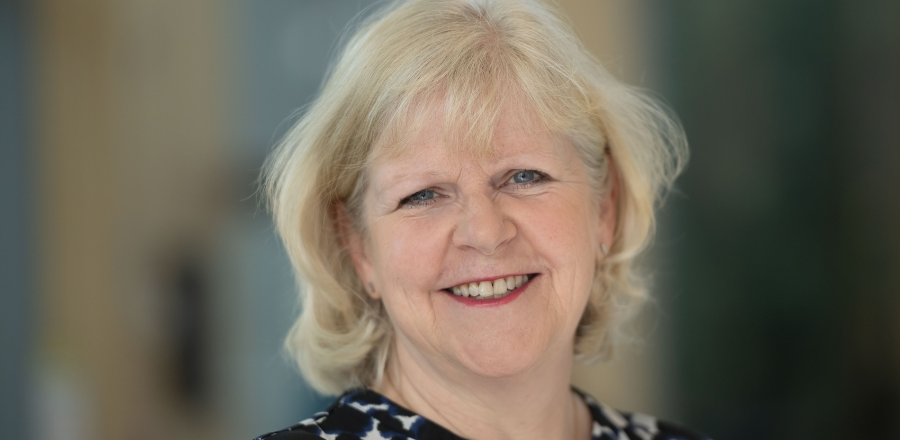New MS Doctoral Training Centre launches at Glasgow Caledonian

Glasgow Caledonian University has become Scotland’s first MS Doctoral Training Centre helping people with moderate to severe multiple sclerosis (MS) manage their symptoms with physical activity.
MS is a condition that can affect the brain and spinal cord, causing a wide range of potential symptoms, including problems with vision, arm or leg movement, fatigue or balance.
Scotland has the highest rates of MS in the world with more than 15,000 people living with the condition and the University has been at the forefront of ground-breaking research into the condition for years.
That is why experts in the School of Health and Life Sciences have been awarded £430,000 by the MS Society to set up a dedicated research centre at the Glasgow campus.
Glasgow Caledonian’s School of Health and Life Sciences’ (SHLS) Professor in Allied Health Science Lorna Paul is leading the five-year project. The Centre will take on nine new PhD fellows, one registered at the University of Strathclyde, to investigate exercise and physical activity for symptom and disease management for people with moderate to severe MS.
The MS Society’s donation will fund four PhD students, Glasgow Caledonian is funding two students and NHS Ayrshire & Arran, through an endowment fund, will pay for one student specifically focused on people with high levels of disability. The project is also supported by Scottish Ballet, Glasgow-based PAL Technologies, who make physical activity monitors, and a further 31 co-applicants.
Professor Paul, from the Department of Physiotherapy and Paramedicine, explained that previous research has shown that exercise can help ease symptoms but most of the existing evidence and guidelines around physical activity focus on people with mild MS and there’s not enough evidence on how it can help people with moderate to severe MS.
Find out more about the new MS Doctoral Training Centre in a special STV News feature - https://news.stv.tv/v/scotlands-first-multiple-sclerosis-doctoral-training-centre-opens.
Professor Paul, who also co-leads the SHLS Research Centre for Health (ReaCH) Stroke and Neurological Rehabilitation Research Group (SYNERGY), said: “We are really excited to be hosting the MS Society’s only Doctoral Training Centre in Scotland. Within the centre we hope to answer the ‘What, When and How?’ questions in relation to physical activity for people with MS and higher levels of disability.
“Although some of the studies will be laboratory based, we will particularly focus on the implementation of physical activity and exercise programmes in the ‘real world’ addressing practical issues as well as theoretical issues. The nine PhD students will work closely together and we hope a number of the students will go on to be the MS symptom management research leaders of the future.
“We need to develop the evidence. We need to know what people can do and the best way to do it, how to encourage people, how to keep people motivated, how to make sure that people have got access and opportunity to exercise. One specific issue we might consider is what happens if you live in a remote area compared to living in the city, obviously topical in Scotland? There so many questions that need to be answered and the aim of the centre is to find those answers and improve the lives of people with MS, not just here in the UK but around the world.”
The research builds on ongoing research projects at the University’s SHLS Research Centre for Health, including a study on how dance could help people MS and developing virtual reality games for upper limb rehabilitation.
Dr Clare Walton, MS Society Head of Research, said: “To achieve our vision of a world free from the effects of MS, we need to attract and develop the best talent to work in MS research. For many years, we’ve funded PhD students to take their first steps into a career in MS research. But we recognise the need to do more to develop and keep these researchers in the field. And we’ve developed our new Doctoral Training Centres with them in mind.
“By providing funding and support for these PhD students, our Doctoral Training Centres aim to build capacity in MS symptom management research. The funding will enable them to explore new research ideas as well as build up their skills and networks. All this will maximise the chances of their research making a difference to people living with MS.”
Click on the link for more information on the MS Doctoral Training Centre at Glasgow Caledonian.
For information on our Physiotherapy and Paramedic Science courses click on the links below
- https://www.gcu.ac.uk/study/courses/undergraduate-physiotherapy-glasgow-
- https://www.gcu.ac.uk/study/courses/undergraduate-paramedic-science-glasgow

